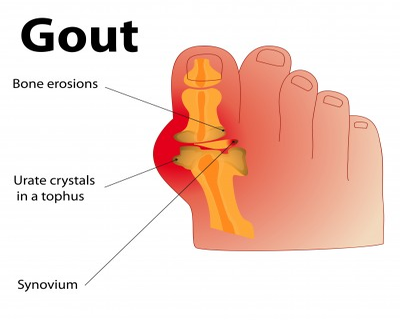- Home
- Editorial
- News
- Practice Guidelines
- Anesthesiology Guidelines
- Cancer Guidelines
- Cardiac Sciences Guidelines
- Critical Care Guidelines
- Dentistry Guidelines
- Dermatology Guidelines
- Diabetes and Endo Guidelines
- Diagnostics Guidelines
- ENT Guidelines
- Featured Practice Guidelines
- Gastroenterology Guidelines
- Geriatrics Guidelines
- Medicine Guidelines
- Nephrology Guidelines
- Neurosciences Guidelines
- Obs and Gynae Guidelines
- Ophthalmology Guidelines
- Orthopaedics Guidelines
- Paediatrics Guidelines
- Psychiatry Guidelines
- Pulmonology Guidelines
- Radiology Guidelines
- Surgery Guidelines
- Urology Guidelines
Allopurinol dose escalation unlikely to improve survival in gout

A new study published in Arthritis & Rheumatology found that Allopurinol dose escalation is unlikely to improve the survival of patients with gout.
Observational data suggest that hyperuricemia and gout are associated with increased mortality, while allopurinol use is associated with reduced mortality. In addition, the protective effect of allopurinol may be dose-dependent.
Coburn and associates conducted a study to determine whether allopurinol dose escalation is associated with cause-specific mortality in patients with gout.
The authors performed a 10-year observational, active-comparator study of U.S. clinicians with gout who initiated treatment with allopurinol. The study included 6,428 dose escalators and 6,428 matched non-escalators. Cox proportional hazards models and competing risks regression analyses were used to assess differences in cause-specific mortality between patients whose allopurinol dose was escalated (dose escalators) and those whose allopurinol dose was not escalated or was reduced (non-escalators) over a 2-year period.
Read Also: NSAIDs vs Steroids for Acute Gout Pain
Key study findings:
- Among the 6,428 dose escalators and 6,428 matched non-escalators, there were 2,867 deaths during the observation period (40.4 deaths per 1,000 person-years).
- Dose escalators experienced an increase in all-cause mortality with the effect sizes being similar for the incidence of cardiovascular-related deaths and cancer-related, although neither reached statistical significance.
- Dose escalation to achieve the goal of lowering the serum urate (SU) level to <6.0 mg/dl was infrequent.
- At 2 years, 10% of dose escalators were receiving a final daily dose of >300 mg and 31% had achieved the SU goal.
- In a sensitivity analysis limited to dose escalators achieving the SU goal, there was a nonsignificant reduction of 7% in the hazard of cardiovascular-related mortality.
“This is the largest study to date to investigate the effects of allopurinol use on mortality and is the first to use a rigorous active-comparator design. Dose escalation was associated with a small (<10%) increase in all-cause mortality, thus showing that a strategy of allopurinol dose escalation, which in current real-life practice is characterized by limited dose increases, is unlikely to improve the survival of patients with gout”, write the authors.
For reference log on to https://doi.org/10.1002/art.40486

Disclaimer: This site is primarily intended for healthcare professionals. Any content/information on this website does not replace the advice of medical and/or health professionals and should not be construed as medical/diagnostic advice/endorsement or prescription. Use of this site is subject to our terms of use, privacy policy, advertisement policy. © 2020 Minerva Medical Treatment Pvt Ltd